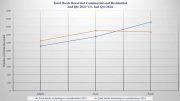What to expect with tax sales
Do you plan to attend your first tax sale soon? Many new and experienced investors attend these sales, hoping to bag the best properties. While this only sometimes happens, buying properties below their market value is possible.
You can then sell them as they are for a profit or fix them and hold them to appreciate. However, only some properties you buy at a tax sale will profit you. Read along to understand what to expect at tax sales.
What is a tax sale?
Tax sales are simply auctions. Different municipalities hold them nationwide to sell delinquent properties with tax arrears. If a property owner doesn’t pay property taxes as required, the city will issue a lien on the property after repeated reminders. The lien will be sold at the tax sale.
While no property owner wants their property on the chopping block, investors see tax sales as opportunities to purchase properties at lower prices. This is because most bids at tax sales start as low as the owed taxes plus penalties. As a result, the winning bid may be below the property market value.
Tax sales differ depending on thejurisdiction
Tax sales vary significantly depending on the jurisdiction. Each municipality has its own tax sales rules and procedures. The most significant difference is the type of tax sale.
There are two types of tax sale: tax lien sale and tax deed sale. In a tax deed sale, the government sells the property. In a tax lien sale, they sell the right to collect owed taxes plus interest from the property owner.
Tax sales also differ in the redemption period allowed. Some municipalities give the property owner a specific period to repay the lienholder the amount spent on the lien plus interest. This is so they can recover the property.
Other municipalities don’t have a redemption period, so the moment the investor pays the bid amount, they become the new property owner. Before participating in tax sales, learn about the municipality’s tax sales rules.
Tax sales are very competitive
Bidders at tax sales are very competitive. Who wants to avoid acquiring properties at a significant discount? Unfortunately, some of these people have been in the game for so long, so there is little they don’t know. This is a major challenge for new investors.
To give yourself a fighting chance, attend several tax sales as an observer. It will help you understand the process and develop your strategy. You can also get mentorship from experienced tax sales investors.
Properties sold in tax sales may have other liens
Although you can make good money investing in tax-exempt properties, they also come with risks. If you are not careful and thoroughly research the properties you are interested in, you may later find out they have other liens after buying.
These can be mortgages or home equity lines of credit. Unfortunately, you’ll have to settle the lien yourself at that point. This will lower your profit margin.
Redemption periods can affect your investment
As mentioned above, some municipalities allow redemption periods. This means the property owner can pay off the debt plus interest and recover the property. While this is good for the homeowner, it is not for the investor. This is because they need full control of the property.
Moreover, when the owner pays back the money, it won’t be as profitable as acquiring the property outright. This is even after waiting a few months to several years, depending on the municipality.
Potential for high returns
Despite the risks, purchasing delinquent properties sold at tax sales remains one of the best ways to acquire properties at a significant discount. If you do your due diligence, you will likely have higher-return properties. You can sell them as they are, improve them, and sell or rent them out.
Even when you purchase a tax lien, you will earn interest on the amount you paid to cover delinquent taxes. Even though interest rates vary widely, they tend to be higher than traditional investment returns.
Risk
Even though you may have heard good things about tax sale properties, they come with risks. You should thoroughly research to make the best purchase from a tax sale.
Some risks of tax sale properties include other liens or financial obligations you might have to bear. The property is sold ‘as is,’ so you won’t inspect it. There could be legal problems with the title. Also, handling tenants behind on rent or evictions can be challenging. Getting a loan for such properties is hard because banks consider them risky.
Tax sales can be hard to navigate, especially for novice investors. But that doesn’t mean they are impossible. You can still go in, make boss moves, and walk away with incredible properties. You only have to be prepared.







Be the first to comment on "What to expect with tax sales"